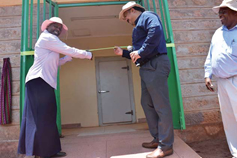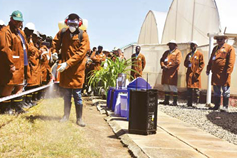CIMMYT Shows Partners in Kenya New Breakthroughs in Maize and Wheat Research

On the first day, CIMMYT invited IMIC researchers to evaluate Material Under Development at the Kiboko site. These maize lines are not publicly released yet but are available to IMIC partners, so they can select the most promising ones for their research and crop improvement work. Each seed company was looking for certain traits to develop new hybrid varieties. For instance, Samit Fayek, from Fine Seeds Egypt was looking for ‘erect type’ maize, as he wants higher crop density and grains that look big. Christopher Volbrecht, from Lake Agriculture in South Africa, was looking for “cobs that stick out as this is what farmers want.” Josephine Okot, from Victoria Seeds in Uganda, said that “seed companies often look at drought tolerance only, but we need now to integrate resistance to Maize Lethal Necrosis.”
Next on the tour to Kiboko, partners visited various stress-tolerant breeding materials, sustainable intensification cropping demonstrations and the Doubled Haploid facility. Vijaya Chaikam, Maize Doubled Haploid Scientist, explained how CIMMYT uses this methodology to cut down breeding time from six to two cycles, which drastically reduces costs.
According to B.M. Prasanna, director of CIMMYT’s Global Maize Program and the CGIAR Research Program MAIZE, doubled haploid breeding is possibly the biggest innovation to speed up genetic gain since the inception of hybrid technology a century ago. “In the next 4 or 5 years, CIMMYT aims at 80 percent use of double haploid lines for new hybrid development; breeding will be faster and much cheaper that way,” Prasanna said. “For now, breeders and seed companies need to know how to use double haploid lines to costefficiently crossbreed with their varieties for high-quality hybrids.”

At the end of the visit to Kiboko, CIMMYT officially opened a new maize seed storage cold room. This facility will serve to keep seeds in good condition and to better manage inventory. At the opening were the director of KALRO’s Food Crops Research Institute, Joyce Malinga, CIMMYT’s Africa Regional Representative, Stephen Mugo, and CIMMYT’s Technical Lead for the Global Maize Program, Aparna Das.
Fighting Maize Lethal Necrosis and rust in Naivasha
On the second day, partners visited the Naivasha research station. There, CIMMYT presented the latest efforts to contain Maize Lethal Necrosis (MLN), a devastating maize viral disease first reported in Kenya in 2011 which caused severe crop losses across Eastern Africa, causing severe crop losses. The Naivasha research station is home to a world-class facility to screen for Maize Lethal Necrosis, jointly managed by CIMMYT and KALRO.
At the facility, maize lines are evaluated for MLN resistance. The best lines and varieties are nominated for further development and shared with partners. National Agriculture Research partners can request MLN screening at no cost, while private seed companies are charged for the service. In the last four years, more than 150,000 germplasm have been screened.
CIMMYT wheat scientist Mandeep Randhawa explained how to recognize the different types of wheat rust diseases: stem, stripe and leaf rusts. He emphasized the Ug99 black stem rust strain, which appeared in Uganda in 1998 and has since severely impacted wheat production in the region and globally. Randhawa explained how CIMMYT develops varieties resistant to stem rust using a phenotyping platform and marker-assisted selection.
These two field days were a great opportunity to showcase progress in developing more resilient maize varieties in a fast and costeffective way. This responsiveness is crucial as pests and diseases continue to threaten the livelihoods of African smallholders. Such impact could not happen without the strong collaboration between CIMMYT and KALRO.
The Doubled Haploid Facility in Kiboko and the Maize Lethal Necrosis screening facilty in Naivasha were opened in 2013 with support from the Bill & Melinda Gates Foundation and the Syngenta Foundation.
The International Maize Improvement Consortium (IMIC) is a public-private partnership initiative launched in May 2018 as part of CIMMYT’s mission to ramp up seed breeding and production innovations.